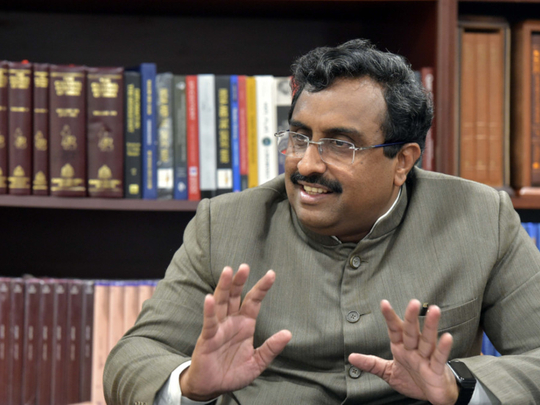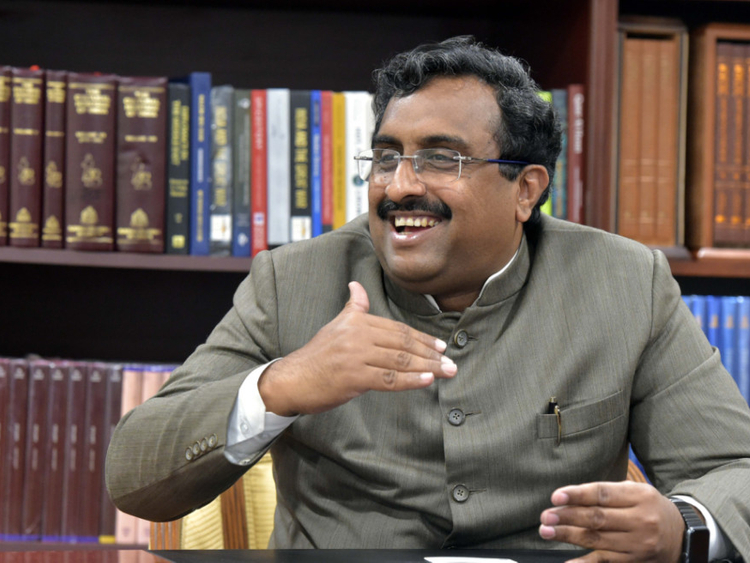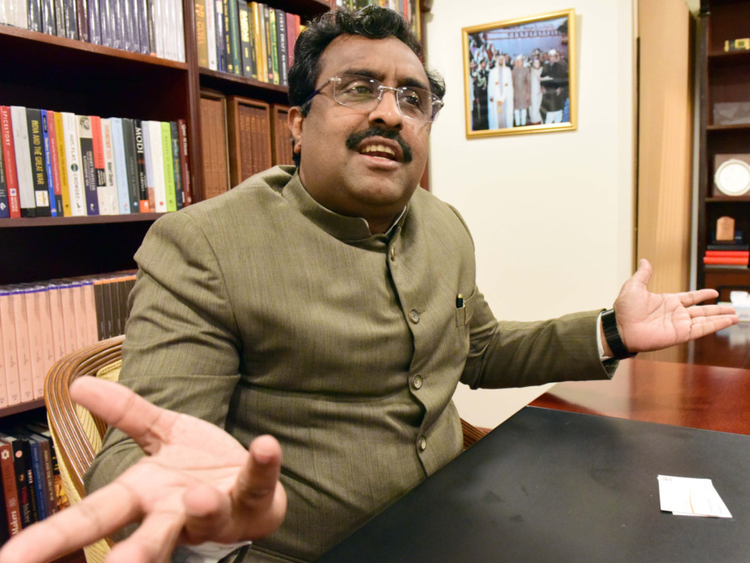
Abu Dhabi: Indian Prime Minister Narendra Modi is likely to visit the UAE early next year, a senior member of his party, told Gulf News here on Sunday.
Ram Madhav, general secretary of the ruling Bharatiya Janata Party (BJP), who was on a visit to the UAE, said India attaches great importance to bilateral ties between the nations and Modi’s second planned visit will further strengthen them.
Madhav is one of the seven general secretaries of the BJP and is handling several important assignments. He is in-charge of Jammu and Kashmir and India’s northeastern states and was once dubbed by the media as Modi’s pointsman for international outreach. Some say he holds number three position in the party after Modi and BJP president Amit Shah.
In an interview at Indian Embassy in Abu Dhabi on Sunday, Madhav spoke on a range of issues. Below are the excerpts:
What brings you to the UAE?
This year, the government is celebrating the birth centenary of the BJP ideologue, Pandit Deen Dayal Upadhyay, and the embassies of Oman and UAE have organised events as part of the celebrations. I came here to speak in these events.
How you describe India’s relationship with the UAE?
We have a very important relationship with the UAE, defined by trade and commerce and by people to people contacts. Of late, it has matured into a strategic partnership and our prime minister attaches great importance to this relationship. He has good personal-level relations with the UAE rulers … he came to the UAE in August 2015 and the UAE leaders visited India. There will be most likely another visit by our prime minister early next year and this will further strengthen our relationship.
You are in charge of Jammu and Kashmir. What is your party’s approach to resolve this conflict and how is it different from previous governments?
We have been facing [the] Kashmir problem for the last two decades now. We have terrorism that is largely funded and supported by forces across the border. Then we have local separatist elements in the Kashmir Valley. The separatists have links with forces across the border in Pakistan but a majority of people in Kashmir are peace-loving and they are integral part of the Indian union. We have to respect the majority sentiment, which is largely with India … they lack development and the government has sanctioned a Rs80,000 crore [Rs800 billion, Dh45 billion] development package. At the same time, we have decided to end terrorism … the underground activity of terrorists who are active in a couple of districts.
But wasn’t this the approach of the previous government — spend on development and fight terrorists? It didn’t work.
It is working for us this time [around] because we are not just limiting to a crackdown on underground terrorists. We are also legally proceeding to finish their overground supporters, including sections of Hurriyat Conference and businessmen who fund terrorism. We have tightened screws on these forces through legal means and choked terror financing.
But the terrorist attacks are still continuing …
The intensity is much less and the Valley is largely peaceful now. Our multi-pronged approach of choking terror financing, tackling terrorists with an iron hand and spending on development is yielding good results.
Will your partnership with the PDP [Peoples Democratic Party] continue beyond the next elections?
We have come together on a common agenda and we want to continue for full six years. We have three more years to go and these things depend on our equations closer to elections but we would like to give a stable government to the state.
Modi has condemned killing of Muslims by cow vigilantes and asked the states to take action. But his words seem to have made little impact. In Pehlu Khan’s lynching case, for example, the police have released the suspects.
We have specific laws for cow protection and a number of states have promulgated anti-cow slaughter laws. Wherever people take law into their hands, they will be dealt with strictly. That’s what the prime minister has said — any kind of vigilantism in the name of cow cannot be allowed. In India, two things happen. One, people violate these laws and indulge in cow smuggling and that creates backlash at some level. We have enough instances where these smugglers have indulged in atrocities against villagers and those cases are not highlighted. Two, there are some cases where unruly elements have taken things into their hands and in both the scenarios states have been asked to act tough. But, in any given case, if the judiciary takes a position then that has to be respected. If there is no evidence against a particular group, the courts take appropriate decision.
But Pehlu Khan’s case was handled by Rajasthan police and it released the suspects despite a video evidence against them.
These matters are dealt with in a legal, transparent manner. We have seen people spending time in jail for many years. Legal process will be strictly followed and one should not question India’s legal process.
There is a perception among Muslims that BJP governments in several states are targeting professions that employ Muslims. For example, mutton shop owners and slaughter houses were targeted by officials. Muslims say they are targeted because they don’t vote for the BJP. How do you respond to that?
It is a wrong perception deliberately created. We do not discriminate with anybody on the basis of his or her religion. Yes, we get relatively less support from certain communities but that doesn’t mean no one from these communities supports us. We have ministers, parliamentarians and legislators from several communities and we are not against any community when we make laws. We make laws by keeping the country’s interest in mind and if a law is impacting any group it should not be seen as against any community. We had demonetisation, which had affected people from every community.
When Yogi Adityanath became chief minister of Uttar Pradesh there was a crackdown on mutton shops. What do you say about that move?
It was a crackdown on illegal mutton shops and we have a system of licensing. There was no restriction on legal business and no state can allow any illegal activity.
On India’s Independence Day, on August 15, BJP governments in Uttar Pradesh and Madhya Pradesh directed Muslim schools or madrasas to provide video evidence of national flag hoisting. Muslims say the BJP wants them to prove their patriotism. Your comments?
These instructions were issued by madrasa boards that insisted on organising these events and I think these instructions were in good spirit.
But why only Muslim institutions? Why no other institutions were asked to provide video evidence?
Under the UGC [University Grants Commission] system, every university has to organise Independence Day and Republic Day celebrations. In a given state if a madrasa board decides to ask the madrasas to follow it strictly, it is only for the general good of the community and should not be seen as a test of patriotism.
Fair enough, but why a video evidence to prove patriotism?
Let the madrasa boards deal with it as the board leaders are from the same community. As far as I understand they did not ask for a proof, they asked for videos to be sent to the board. This was construed as a condition. In any case this was for a good cause and I don’t think anybody should raise objections.
The BJP has been accused of creating an environment that is leading to attacks and killings of writers and journalists. Critics cite the example of Gauri Lankesh’s murder. How do you respond?
This is a very funny argument. The BJP has created an environment so that a murder takes place in [a] Congress-ruled state? These are all misconceptions being created by certain sections. Every killing must be condemned but the state governments concerned have to take responsibility for such incidents. We have condemned Gauri Lankesh’s murder and have asked the state to order a CBI [Central Bureau of Investigation] inquiry. One month has passed and the Karnataka government has no clue. In Karnataka, tens of RSS [Rashtriya Swayamsevak Sangh] workers were murdered but no one talks about these incidents.
But the prime minister did not condemn Lankesh’s murder …
Every murder needs to be investigated thoroughly. Let the governments investigate these killings.
A senior journalist, Ravish Kumar, has alleged that people issuing death threats to him are being followed by the prime minister on Twitter. Why Modi is not unfollowing these elements?
No one can get away after violating the law and law will take its own course. If anybody has faced any threats on social media they should approach the police. The legal system in India is transparent and does not discriminate with anyone on party basis.
But Kumar has written to the prime minister.
Fair enough. Anybody can write a letter to the prime minister. But he [Kumar] should approach the courts and police. So many death threats are issued to people, including the prime minister. However, to go to the town saying that, ‘I have death threats’, is immature. He [Kumar] is known for his immaturity.
Do you think Modi government’s popularity has been dented by poor performance of the economy. The international media has also criticised him for mishandling the reforms.
Nothing has gone wrong. The PM is trying to set Indian economy’s basics right. No country can aspire to become great with active corruption and black money. We have to correct those basics, take transformative steps. There will be a temporary period of pain; and the country is behind the prime minister. I do not agree with your view that international media is criticising him. On the contrary, international media has made great projections for Indian economy. We want an economy that is clean, transparent and a system where an investor can have faith. That is the direction where we are heading — one country, one law and total abolition of black money. Criticism is about the temporary difficulties we are facing. How to do you gauge the popularity of a government? You will find out when the elections are held.
Profile
• National General Secretary of the Bharatiya Janata Party.
• Former member of the National Executive and in-charge of the media and public relations of the Rashtriya Swayamsevak Sangh
• A director of India Foundation, a think tank and non-government based in New Delhi.
• Journalist
• Author of several books
• He holds a masters in Political Science from University of Mysore and diploma in Electrical Engineering from Andhra Pradesh.














